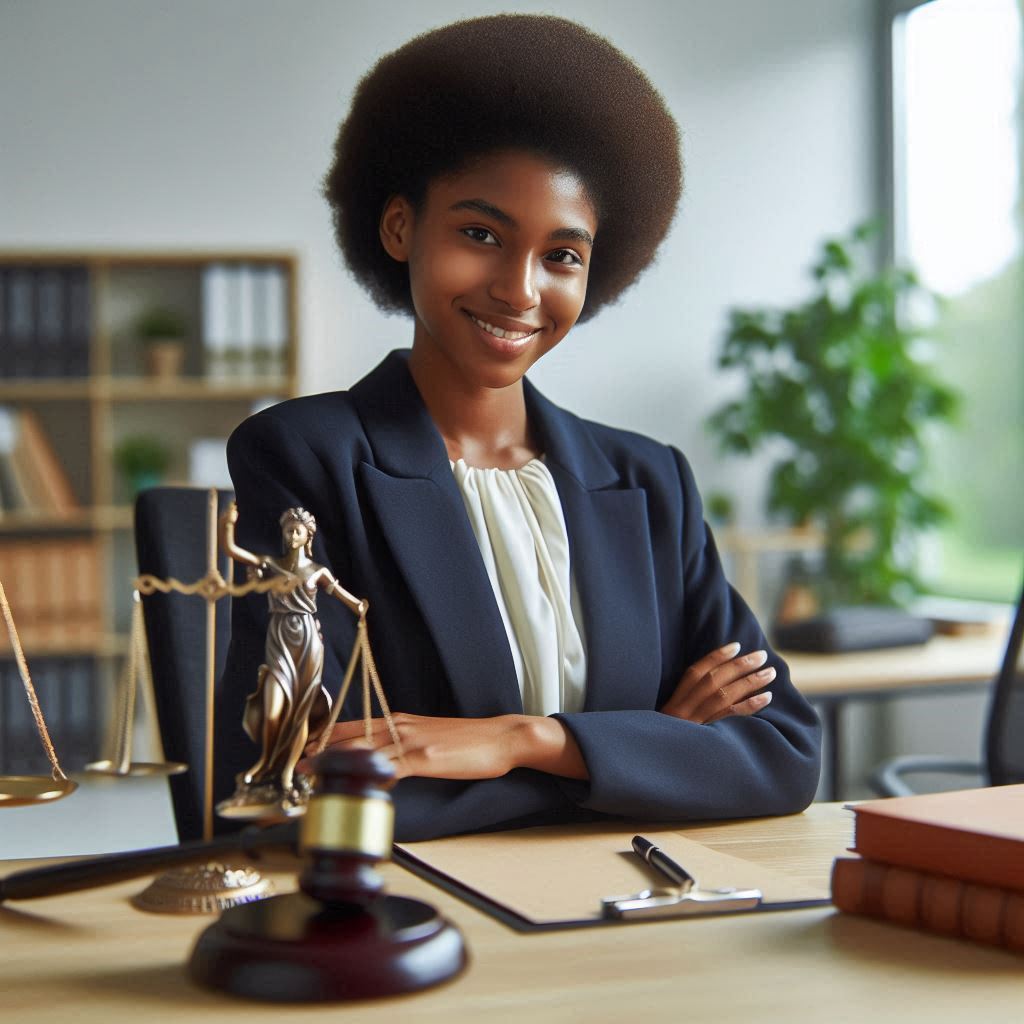Introduction
Human rights and civil rights lawyers play a crucial role in advocating for justice and equality in society.
Understanding the distinction between these two types of lawyers is essential for anyone interested in legal matters.
Importance of Understanding the Difference
Differentiating between human rights and civil rights lawyers is significant because each specializes in distinct areas of law.
Human rights lawyers focus on promoting and protecting universal rights on a global scale, while civil rights lawyers advocate for the rights of individuals within a specific legal system.
Knowing the nuances between these types of lawyers can help individuals or organizations identify the right lawyer for their legal needs.
Key Differences between Human Rights and Civil Rights Lawyers
- Scope: Human rights lawyers work on international issues and cases that concern broad principles of equality, freedom, and dignity across borders.
In contrast, civil rights lawyers primarily handle cases within a specific legal jurisdiction that focus on protecting the rights of individuals or groups within that society. - Legal Framework: Human rights lawyers often operate based on international treaties and conventions, such as the Universal Declaration of Human Rights, to protect and promote human rights globally.
On the other hand, civil rights lawyers work within the framework of national or local laws to enforce and safeguard the rights of citizens within a specific country. - Focus Areas: Human rights lawyers may engage in issues like refugee rights, gender equality, indigenous rights, and environmental justice on a global scale.
In contrast, civil rights lawyers commonly deal with discrimination, police misconduct, voting rights, and employment discrimination within the legal system of a particular country.
Understanding the differences between human rights and civil rights lawyers can help individuals or organizations make informed decisions when seeking legal representation for their specific needs.
By recognizing the unique roles and focus areas of these legal professionals, clients can choose the right lawyer to effectively advocate for their rights and seek justice in the legal system.
Definition of Human Rights Lawyers
Human rights lawyers are legal professionals who specialize in defending and promoting the fundamental rights and freedoms of individuals.
They play a crucial role in ensuring that human rights are protected and upheld in society.
Roles and Responsibilities of Human Rights Lawyers
- Advocating for marginalized and vulnerable populations
- Filing lawsuits on behalf of victims of human rights violations
- Providing legal representation in cases involving discrimination, torture, and other abuses
- Raising awareness about human rights issues through public campaigns and education
- Collaborating with international organizations to address global human rights concerns
Focus of Human Rights Lawyers on Protecting Basic Human Rights
Human rights lawyers focus on protecting basic rights such as the right to life, the right to freedom of speech, the right to a fair trial, and the right to privacy.
They work tirelessly to ensure that these rights are respected and upheld by governments and other entities.
Examples of Cases That Human Rights Lawyers Typically Handle
- Representation of political prisoners facing unfair trials
- Defending individuals subjected to torture and abuse by state authorities
- Filing lawsuits against corporations for human rights violations in their operations
- Advocating for the rights of refugees and asylum seekers
- Championing equal rights for marginalized communities such as LGBTQ+ individuals and minorities
Human rights lawyers are a vital part of the legal profession, working tirelessly to ensure that all individuals are treated with dignity and respect, regardless of their background or circumstances.
Read: Top Skills for a Successful Claims Adjuster Career
Definition of Civil Rights Lawyers
Roles and responsibilities of civil rights lawyers
Civil rights lawyers advocate for individuals whose civil liberties are violated. They work to ensure that people’s basic rights are upheld under the law.
These attorneys often represent clients in cases involving discrimination, unjust treatment, or violations of constitutional rights.
They provide legal representation in court and offer advice on how to navigate legal challenges.
Civil rights lawyers also engage in advocacy and lobbying efforts to promote legal reforms and protect individual freedoms.
Their work includes gathering evidence, preparing legal documents, and presenting cases before judges and juries.
Focus of civil rights lawyers on protecting civil liberties and rights guaranteed by the Constitution
Civil rights lawyers concentrate on safeguarding civil liberties guaranteed by the Constitution.
They address issues like freedom of speech, the right to a fair trial, and protection against unreasonable searches.
Transform Your Career Today
Unlock a personalized career strategy that drives real results. Get tailored advice and a roadmap designed just for you.
Start NowTheir focus includes ensuring equal treatment regardless of race, gender, religion, or disability.
They fight against systemic injustices and advocate for policies that enhance civil liberties.
By challenging discriminatory practices and defending constitutional rights, these lawyers work to uphold democratic principles and justice.
Examples of cases that civil rights lawyers typically handle
Civil rights lawyers often handle cases involving racial discrimination, police brutality, and wrongful arrests.
They might represent individuals in employment discrimination cases or disputes over voting rights.
For example, they may work on cases related to segregation, harassment, or violations of privacy.
They also address issues of wrongful imprisonment and cases of inadequate legal representation.
Each case aims to rectify injustices and ensure that all individuals receive fair treatment under the law.
Read: Notable Human Rights Lawyers and Their Cases
Educational Background and Training
Human Rights Lawyers
- Law Degree: To become a human rights lawyer, individuals must first earn a law degree from an accredited law school.
- Specialized Courses: They may choose to focus on courses related to international law, human rights law, and social justice.
- Advanced Degrees: Some human rights lawyers pursue advanced degrees such as an LLM in Human Rights Law.
- Internships: Internships with human rights organizations are recommended to gain practical experience in the field.
Civil Rights Lawyers
- Law Degree: Civil rights lawyers also need a law degree from an accredited law school.
- Focus on Civil Rights Law: They typically take courses that focus on civil rights laws and constitutional law.
- Bar Exam: Passing the bar exam in the state where they intend to practice law is necessary for licensure.
- Hands-on Experience: Civil rights lawyers may benefit from working with civil rights organizations or government agencies.
Read: Career Opportunities for Human Rights Lawyers

Legal Framework and Jurisdiction
Legal framework that human rights lawyers work within
When it comes to the legal framework within which human rights lawyers work, they are primarily guided by international human rights laws and treaties.
These laws set out the basic rights and freedoms that all individuals are entitled to, regardless of their nationality, race, or gender.
Human rights lawyers often advocate for the protection and promotion of these rights on a global scale.
They may work with international organizations such as the United Nations or regional bodies like the European Court of Human Rights to address human rights violations and hold governments accountable for their actions.
Jurisdiction of Civil Rights Lawyers
Civil rights lawyers, on the other hand, operate within the legal framework of domestic laws, primarily at the state and federal levels.
They focus on issues related to discrimination, segregation, voting rights, and equal access to public services.
Civil rights lawyers often litigate cases under laws such as the Civil Rights Act of 1964, the Voting Rights Act of 1965, and the Americans with Disabilities Act.
These laws are designed to protect individuals from discrimination based on characteristics such as race, gender, disability, and sexual orientation.
Civil rights lawyers play a crucial role in ensuring that these laws are enforced and that individuals are able to exercise their rights without fear of discrimination.
Overlapping Areas of Collaboration
While human rights and civil rights lawyers may operate within different legal frameworks, there are areas where their work overlaps.
Transform Your Career Today
Unlock a personalized career strategy that drives real results. Get tailored advice and a roadmap designed just for you.
Start NowFor example, both human rights and civil rights lawyers may collaborate on cases involving issues such as police brutality, racial profiling, or discrimination in the criminal justice system.
They may also work together to advocate for the rights of marginalized communities, refugees, or asylum seekers who face violations of their human and civil rights.
By working together, human rights and civil rights lawyers can leverage their expertise and resources to address complex legal issues and promote social justice and equality.
Collaboration between these two groups can lead to more impactful outcomes and greater protection of rights for individuals around the world.
Read: How Bankruptcy Trustees Manage Secured Debts
Clientele and Advocacy
Typical clients that human rights lawyers represent
Human rights lawyers typically represent marginalized groups or individuals facing human rights abuses.
- They advocate for social change and reform through various strategies.
- These strategies may include litigation, advocacy campaigns, and community outreach.
- Human rights lawyers often work with international organizations to address global human rights violations.
Clients that human rights lawyers represent
In contrast, civil rights lawyers primarily represent individuals in cases of discrimination or unfair treatment.
- They focus on enforcing existing civil rights laws to protect the rights of individuals.
- Civil rights lawyers may work on cases involving employment discrimination, housing discrimination, or police misconduct.
- They often collaborate with civil rights organizations and advocacy groups to advance their clients’ rights.
Overall, while both human rights and civil rights lawyers are dedicated to promoting justice and equality, they serve different clientele and utilize distinct advocacy techniques to achieve their goals.
Legal Remedies and Enforcement
Human rights lawyers play a vital role in providing legal remedies for clients who have experienced human rights violations.
These lawyers often represent their clients in international courts or human rights commissions.
This allows them to seek justice on a global scale and hold perpetrators accountable for their actions.
On the other hand, civil rights lawyers focus on seeking legal remedies within the domestic legal system.
They may file lawsuits against individuals or entities responsible for violating their clients’ civil rights.
This can lead to settlements, court judgments, or other means of redress to address the harm caused by such violations.
Human Rights Lawyers
- Represent clients in international courts or human rights commissions
- Hold perpetrators of human rights violations accountable
- Seek justice on a global scale
Civil Rights Lawyers
- Seek legal remedies within the domestic legal system
- File lawsuits against perpetrators of civil rights violations
- Obtain settlements or court judgments to redress harm
Challenges and Limitations
Both human rights and civil rights lawyers face challenges and limitations in enforcing human rights and civil rights laws.
Human rights lawyers may encounter difficulties in holding perpetrators accountable due to jurisdictional issues or lack of cooperation from governments.
Civil rights lawyers, on the other hand, may face challenges in proving violations of civil rights in court or obtaining sufficient evidence to support their cases.
In conclusion, human rights and civil rights lawyers play crucial roles in seeking legal remedies and enforcing human rights and civil rights laws.
Despite the challenges and limitations they face, these lawyers remain dedicated to advocating for justice and upholding the principles of human rights and civil liberties.
Conclusion
Human rights lawyers focus on protecting fundamental rights globally, while civil rights lawyers advocate for rights within a specific jurisdiction.
Transform Your Career Today
Unlock a personalized career strategy that drives real results. Get tailored advice and a roadmap designed just for you.
Start NowBoth types of lawyers play a crucial role in fighting for justice, equality, and ensuring that rights are upheld.
It’s important to recognize the distinct differences between human rights and civil rights lawyers to fully understand their impact.
By learning more about the work of these lawyers, individuals can get involved in advocating for human rights and civil liberties in their communities.
Ultimately, the collaboration between human rights and civil rights lawyers is essential in creating a more just and equitable society for all.
Key Differences Between Human Rights and Civil Rights Lawyers
Human rights and civil rights lawyers both fight for justice but focus on different areas.
Human Rights Lawyers:
- Protect basic freedoms like freedom from torture and the right to life.
- Work globally and tackle issues like genocide and refugees’ rights.
- Often deal with international laws and conventions.
Civil Rights Lawyers:
- Defend citizens’ rights against discrimination and unfair treatment.
- Focus on issues like racial discrimination, gender equality, and voting rights.
- Operate primarily within a country’s legal system.
Importance of Both Lawyers:
- They uphold justice and ensure everyone is treated fairly.
- Both types of lawyers address abuses of power and systemic injustices.
Get Involved:
- Educate yourself about these lawyers’ work.
- Advocate for human rights and civil liberties in your community.
- Support organizations fighting for justice and equality.




